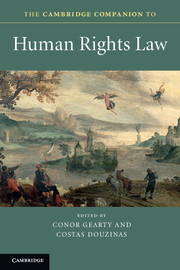Book contents
- Frontmatter
- Contents
- Preface
- Notes on contributors
- Acronyms and abbreviations
- Introduction
- Part I All kinds of everyone
- Part II Interconnections
- Part III Platforms
- 9 Reconstituting the universal: human rights as a regional idea
- 10 The embryonic sovereign and the biological citizen: the biopolitics of reproductive rights
- 11 Spoils for which victor? Human rights within the democratic state
- 12 Devoluted human rights
- 13 Does enforcement matter?
- Part IV Pressures
- Index
- References
12 - Devoluted human rights
from Part III - Platforms
Published online by Cambridge University Press: 05 December 2012
- Frontmatter
- Contents
- Preface
- Notes on contributors
- Acronyms and abbreviations
- Introduction
- Part I All kinds of everyone
- Part II Interconnections
- Part III Platforms
- 9 Reconstituting the universal: human rights as a regional idea
- 10 The embryonic sovereign and the biological citizen: the biopolitics of reproductive rights
- 11 Spoils for which victor? Human rights within the democratic state
- 12 Devoluted human rights
- 13 Does enforcement matter?
- Part IV Pressures
- Index
- References
Summary
To combine in the same mindscape the separate ideas of human rights protection and of devolution prompts a number of thoughts. Some may be at quite a high level of generality; some much more specific to the arrangements of a particular state. At the most general level one might first have in mind the contribution that the study of devolution might make to an understanding of those processes whereby rights, first formulated and proclaimed at an international level, may ‘cascade’ down to the level of the nation state and then to regions within that state and perhaps beyond. This might be seen as a process in which there is an increasing degree of specificity of the rights to be applied – perhaps involving an idea of an initial rights baseline which may be enhanced to a higher degree of rights protection (however such a notion is to be understood) or customised to take account of the conditions – political, social or legal – particular first to the state and then to the regions of a state. If such a cascading vision is to be adopted, it has presumably to be routinely assumed that this process is one that will not be wholly unproblematic. Some of the conditions, specific to a state or region, may, at least at first, conflict, either in their substance or their procedures, with the cascaded rights. Rights deriving from prior national or regional (e.g. Europe-level) rights may not chime precisely with existing ‘rights’ at the devolved level. Judicial procedures for the enforcement of rights (including, for instance, those rules which determine who may seek the enforcement of rights, on what time scale and in the expectation of what remedies) may also adjust only with some difficulty to the enforcement of the newer generation of rights. Rules and procedures may well be necessary for the resolution of uncertainties of hierarchy to decide which rights rules should prevail. Institutions (presumably mainly courts but not exclusively so) need to be empowered to apply these rules of conflict resolution, an issue which may be of particular concern where there is some expectation of a degree of uniformity in the application of rights and yet also a sensitivity to local conditions.
- Type
- Chapter
- Information
- The Cambridge Companion to Human Rights Law , pp. 231 - 248Publisher: Cambridge University PressPrint publication year: 2012
References
- 1
- Cited by



